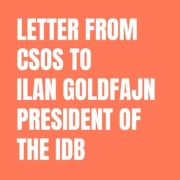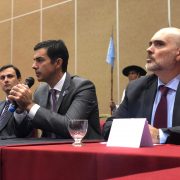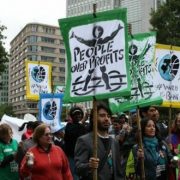The IDB updates its access to information policy in 2020
The Executive Board of the IDB approved on November 4 the beginning of the process for the revision of its policy of access to information, whose last update was in 2011. This process will be open to virtual and face-to-face public consultation, and will be extended until May 2020.
“Below, we offer a google translate version of the original article in Spanish. This translation may not be accurate but serves as a general presentation of the article. For more accurate information, please switch to the Spanish version of the website. In addition, feel free to directly contact in English the person mentioned at the bottom of this article with regards to this topic”.
In 2018, the private sector investment arm of the Inter-American Development Bank, the IDB Invest, carried out an update of its access to information policy; in 2020, it will be the IDB’s turn, in charge of financing the public sector. According to the Bank, this update will be carried out in two phases of public consultations: the first one, started last November 13, will last 45 days and at the end a document called “Profile of Access to Information Policy” will be prepared. The second phase will have 120 days for review where comments on the consultations will be incorporated and a “Policy Draft” will be prepared. After the deadline, said document will be submitted for the consideration and approval of the Board of Directors scheduled for July 2020.
The consultations are open and free for anyone who wants to participate virtually by answering the questions presented by the IDB here or for an open participation by sending an email to consultapai@iadb.org
On the other hand, face-to-face participations will only be by invitation at the Bank Headquarters in Washington DC and for the second phase it is expected to hold meetings in borrowing member countries during the months of February and March 2020, but they have not yet been confirmed.
With respect to the Bank’s performance in terms of its policy of access to information and transparency, according to the index published annually by the Publish What You Fund called “Aid Transparency Index”, the IDB is in the highest category. However, it is evident that he has been in the same position since 2015, so there have been no improvements since that year. This is disturbing considering that in the period 2011-2015 the IDB climbed from the 14th position in the ranking to the 9th position, stalling in the 7th position from 2015 to the present.
It is considered that the last revision of the policy carried out by the Bank in 2011 resulted in the approval of a policy with high standards of access to information and transparency, although subsequently the implementation of said policy has not been effective. This new update in 2020 opens a door for the IDB not only to strengthen and improve the 2011 policy, but also to make progress in its better implementation. However, there is also a risk that the update will result in a weakening and / or dilution of current policy standards, something that the IDB should seek to avoid.
Taking into account the role played by International Financial Institutions such as the IDB in society and the impact generated by the projects they finance, it is essential that they have an updated, effective and accessible access to information policy according to the highest standards international in the matter; in a way that strengthens its transparency and institutional governance.
Thus, it is expected that this process of updating the IDB’s access to information policy will culminate successfully by actually incorporating the requests expressed in the public consultations so that such revision can increase the problems and good practices of the right to access information. , which not only constitutes a human right in itself; It is also essential to implement other rights.
From Fundeps, we invite you to participate in the process and we look forward to more information regarding face-to-face public consultations in Washington and the rest of the countries of Latin America and the Caribbean; and we will actively participate in this update process seeking not only to avoid a dilution of the policy but, on the contrary, to promote its strengthening and improve its implementation.
More information
Author
Florence Harmitton
Contact
Gonzalo Roza, gon.roza@fundeps.org











